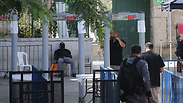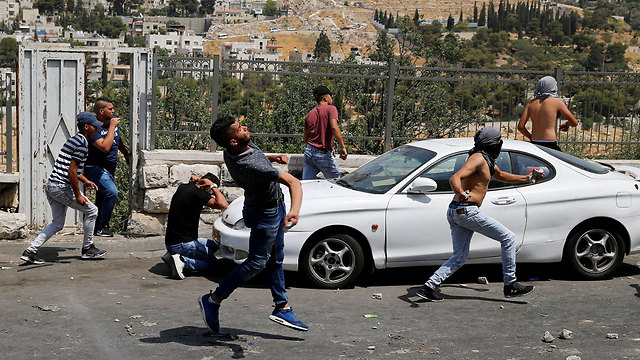
Metal detectors at the Temple Mount. A cowardly statement issued by the cabinet
צילום: אלכס קולומויסקי
Israel looking for a way out of crisis without compromising pride
Analysis: It’s only a matter of time before metal detectors, which have become a symbol of a religious-national Palestinian struggle, gradually disappear from Temple Mount. Israel is trying to emerge from this crisis with minimum damage to its national dignity—and without a third intifada.
A fool threw a stone in a pond, and a thousand wise men are now trying to repair the damage. The metal detectors, which have become a symbol of a religious-national Palestinian struggle, will gradually disappear from the Temple Mount. It’s only a matter of time. What the State of Israel is doing right now is trying to emerge from this affair with minimum damage to its national dignity—and without a third intifada.

On Friday morning, the cabinet issued a cowardly statement, leaving the metal detectors “case” in the hands of the police and the public security minister, who made the mistake in the first place, letting them get more and more entangled. The cabinet actually discussed launching a dialogue with the Jordanians in search of a solution. But we are dealing with dignity here, so they issued a distorted statement defending a controversial decision which barely contributed to security yet caused a lot of damage.
On Friday alone, after 10 hours of violence, three Jews and three Arabs were killed for the sake of this dignity, 250 people were injured (mostly Palestinians) and dozens were arrested, including Israeli Arabs from the northern Islamic branch.

Riots in Jerusalem, Friday. Intifadas have a tendency of growing like a tsunami: It takes time for them to reach the shore and flood everything (Photo: Reuters) (צילום: רויטרס)
More than 13 points of friction were recorded in Jerusalem and the West Bank, with some 12,000 Palestinian rioters. Nevertheless, the defense establishment sources who made the populist-amateurish decision to leave the metal detectors at the Temple Mount keep conveying to the public that the riots are “not what they seem.” After all, a third intifada hasn’t broken out and dozens of people haven’t been killed, on both sides. But intifadas have a tendency of growing like a tsunami: It takes time for them to reach the shore and flood everything.
In the joint operations room established by the different security organizations, as part of the preparations to curb the third intifada, figures are piling up, including concrete warnings of terror attacks, which indicate that the Palestinian street is much more prepared for violence today than it was before the wave of knife attacks in 2015.
In three evaluations of the situation conducted by Defense Minister Avigdor Lieberman over the weekends, it was decided that the army would focus its efforts on the routes and on Jewish communities. Six regiments have been deployed for that purpose, in addition to the regular Central Command forces. They will serve as a physical defense to prevent terror attacks like the murder in Halamish and shooting attacks on the routes. Such attacks may not only thwart any possible solution, but also prompt the radical Jewish sector to take revenge.
If and when a solution is found to end the current wave, it will take time for the soaring violent energy—both in the points of friction on the ground and on social media—to die out. The army, the police and the Shin Bet are preparing to leave forces on the ground until it cools off.
The Palestinian Authority has decided to freeze all ties with the State of Israel. That’s a mishap, because as soon as there’s a solution in sight for the current wave, we’ll need the presence of Palestinian police at the points of friction until the situation calms down. The Shin Bet is already carrying out arrests within the Palestinian population without coordinating its moves with the local security apparatus. This not only creates a potential for a clash with the Palestinian officers, but it also conveys a dangerous message to the population: You can and should confront the Israelis.
The detainees include regular activists and instigators, who belong to organizations like Shabab al-Aqsa and Mourabitoun in the West Bank, activists of the northern Islamic Movement in Israel and dozens of social media instigators here and there.
The murderer from the village of Kobar, who slaughtered the family in Halamish, was located online as well. The “will” left by Omar-al-Abed on Facebook was detected by the joint operations room created by the Shin Bet, the police and the IDF Intelligence Directorate, but it was too late: The forces were dispatched after he had already carried out the attack.
This wasn’t necessarily a quick response failure. It likely has to do with technological restrictions that will have to be solved. The joint operations room has collected information indicating that the Halamish murderer already has a quite a few imitators, and the defense establishment is in a race against time to stop them—before they hit the road.
Major-General Yoav Mordechai, the coordinator of the government’s activities in the territories, told al-Jazeera on Saturday that Israel was willing to look into alternatives that would prevent terror attacks at the Temple Mount and called on Arab states to propose their own alternative. On Friday morning, an emissary arrived in Jordan on behalf of the prime minister to try to come up with a joint solution. Talks are also being held with Egypt. The goal is to find less visible tools, which will still make it possible to monitor the people and means entering the Temple Mount.
Israel isn’t holding any talks with Palestinian President Mahmoud Abbas, as it doesn’t want him to be part of a solution that would strengthen him. Furthermore, Israel sees the talks with the Egyptians and the Jordanians, which the Americans are involved in too, as an opportunity to curb the soaring anti-Israel wave in Sunni countries which Israel has formal and informal relations with.
As long as both arms—the political one, which is looking for a way to get off its high horse, and the military one, which is trying to oppress the violence on the ground—fail to bring results, the current wave of violence won’t disappear. Even in case of an outward appearance of a temporary calm, the violence will most likely erupt again.










